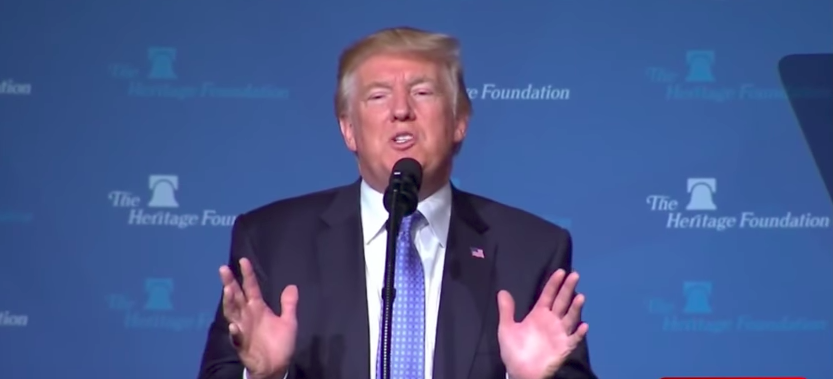
Christmas is still 68 days away, but for President Donald J. Trump, defense of the holiday requires eternal vigilance. Speaking on Tuesday evening at the annual summit of the Heritage Foundation, a conservative think tank in Washington, D.C., Trump vowed to end the "War on Christmas."
The remarks came during a speech in which Trump generally stayed on message, discussing the proposed tax-reform plan Republicans hope to pass this year.
"You're gonna be saying Merry Christmas again," Trump told the audience. It is not clear what, or who, had prevented people from saying "Merry Christmas" in the past. The likely malefactor is political correctness, a favorite (if nebulous) bugbear of Trump and his supporters.
"You go to the stores," Trump continued—at this point obviously speaking without the aid of a Teleprompter and just as obviously delighting in doing so—"and they have the red walls, and they have the snow, and they even have the sleigh and the whole thing."
But, he lamented theatrically, "They don't have Merry Christmas. They don't have Merry Christmas. I want them to say, 'Merry Christmas, everybody.'"
Despite his apparent support for religious liberty, earlier this year, Trump became the first president in more than two decades to not mark Eid al-Fitr, the Muslim celebration that ends Ramadan, the month of fasting.
According to an admirably comprehensive history of the "War on Christmas" by The New York Times, the controversy is in good part the work of Fox News host Bill O'Reilly, who began the campaign in 2005. At its center is the fear that secular liberals are trying to expurgate the last traces of Christianity from American culture. They are doing so by wishing each other "Happy Holidays."
No evidence of a concerted effort by liberals to downplay the importance of Christmas exists, but the fear nevertheless exerts a powerful hold on some. "They say the next step after saying 'Happy Holidays' is abortion on demand and euthanasia," social scientist Dan Cassino of Fairleigh Dickinson University explained to the Times. In other words, the "War on Christmas" is a symbol of anxiety about a nation of rapidly changing demographics, one in which white Christians do not have the influence they once did.
The only thing worse than Christmas creep is War on Christmas creep.
— Paul Haavardsrud (@PaulHaavardsrud) October 18, 2017
Despite Trump's own concern, a survey conducted by Public Policy Polling late last year discovered that only 31 percent of Americans believe that there is a "War on Christmas." Among Trump voters, however, the share who believe such a campaign exists is 60 percent.
"In fact 24 percent of Trump voters say that the War on Christmas concerns them more than a potential war with China would," Public Policy Polling found. That suggests that Trump knows exactly what he is doing when he takes time away from the discussion of tax reform to fight in the trenches alongside Santa Claus.
His critics see it, too. "The Heritage Foundation speech is another sad example of President Trump continuing to pander to the religio-political extremists of the far right," said Rob Boston, communications director for Americans United for Separation of Church and State. "He does this because, according to the recent polls I've seen, they're about the only people still buying the political snake oil he's been peddling now for more than a year."
But it is not clear what Trump can do to " win" the War on Christmas, since the establishment clause of the First Amendment prevents the federal government from endorsing one religion over another. Ronald L. Kuby, the noted civil rights lawyer, says that Trump's invocations of the War on Christmas have "no legally operative effect. He has not ordered federal employees to say 'Merry Christmas' and he has not mandated the firing of those who refuse. As long as his words are not translated into policies, they are just empty rhetorical devices without legal meaning."
Trump plainly relishes cultural warfare as a means of energizing his supporters, reminding him that he remains their champion. He mentioned the "War on Christmas" at the Values Voter Summit last Friday, telling the religious conservatives gathered there, ""We are getting near the beautiful Christmas season that people don't talk about anymore. They don't use the word 'Christmas.'"
I hate when politicians start talking about the War on Christmas before the War on Halloween is even over. https://t.co/06Ph54JhQZ
— Anthony Zurcher (@awzurcher) October 13, 2017
Trump also brought up the War on Christmas in early July. "Benjamin Franklin reminded his colleague at the Constitutional Convention to begin by bowing their heads in prayer," he said at an event at the Kennedy Center. "I remind you that we're going to start saying 'Merry Christmas' again."
It seems highly likely that Trump will return to this line as Christmas nears (and as the controversy over the national anthem protests in the National Football League wanes to some degree). While that may thrill some of his supporters, others see it as a pointless provocation meant to distract from more substantive issues.
"We'd all do better to focus on Halloween," advises Boston of Americans United. "It's more relevant because this presidency is shaping up to be scarier than any horror movie I've ever seen."
Uncommon Knowledge
Newsweek is committed to challenging conventional wisdom and finding connections in the search for common ground.
Newsweek is committed to challenging conventional wisdom and finding connections in the search for common ground.
About the writer
Alexander Nazaryan is a senior writer at Newsweek covering national affairs.
To read how Newsweek uses AI as a newsroom tool, Click here.








